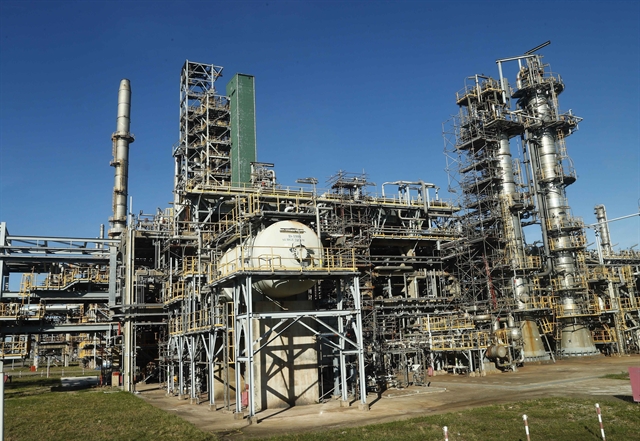 Economy
Economy


|
| Dung Quất Refinery, which is located in the Dung Quất Economic Zone, Bình Sơn District, Quảng Ngãi Province. The Petroleum Law needs revisions to be in line with international practices and the country's energy development strategy. VNA/VNS Photo Doan Tan |
HÀ NỘI – After nearly 30 years of enforcement, the Petroleum Law now needs revisions to be in line with international practices and Việt Nam’s energy development strategy.
Changes are also expected to create momentum for the development of the oil and gas industry.
Nguyễn Văn Quế, General Director of the Cửu Long Joint Operating Company – which is running the Sư Tử Trắng (White Lion) project, said overlaps among existing laws such as the Petroleum Law and the Law on Public Investment have been impeding the implementation of exploration and exploitation projects.
Citing difficulties his company faced when operating Sư Tử Trắng, he said in this law, the regulation on capital preservation at risky projects such as oil and gas exploration and exploitation should be amended in order to attract businesses, especially foreign ones.
Cửu Long JOC also proposed Article 47 on the making, assessment, and approval of development plans for oil and gas wells be revised.
Trịnh Việt Thắng, member of the Members’ Council of the PetroVietnam Exploration Production Corporation (PVEP), said his firm has 35 oil and gas contracts but most of them will soon expire. PVEP carried out 26 projects from 2007 to 2015. However, since the Law on Public Investment took effect in 2016, only two new projects have been signed.
It is difficult to sign and develop new oil and gas projects partly because most of Việt Nam’s investment incentives are related to exploitation zones, not the exploitation scale like in many other countries, he explained.
In addition, projects in the industry are currently subject to regulations in many laws such as the Petroleum Law and the Law on Public Investment. Therefore, for enterprises completely owned by the State like PVEP, all projects in Group B (which are worth between VNĐ120 billion (US$5.13 million) and under VNĐ2.3 trillion) must be submitted to authorities at different levels, which is time-consuming and may encounter problems.
At a seminar on revisions to the Petroleum Law held in Vũng Tàu City on August 5, Deputy General Director of the Vietnam Oil and Gas Group (PetroVietnam) Đỗ Chí Thành called for incentive suggestions so that the investment climate in this industry can regain its attractiveness.
He emphasised the consistent principle that the Petroleum Law must be designed in a manner that concurrently boosts the development of the oil and gas sector and the economy as a whole; protects Việt Nam’s rights and legitimate interests at sea in line with international law; ensures human and property safety as well as investors’ legitimate interests on the basis of respecting Việt Nam’s independence, sovereignty, territorial integrity and national security, and adhering to the country’s laws.
Chairman of the Vietnam Petroleum Association Nguyễn Quốc Thập said the law should be revised comprehensively, and even a new petroleum law should be created to meet current demand.
He pointed out that many oil and gas projects are being implemented in sensitive areas, so in many cases, they could not be offered for open international bidding. Besides, many such projects are located offshore and need a large number of accompanying supplies and services, thus causing additional expenses. All of these issues should be regulated in the new law to attract foreign investors.
Meanwhile, Deputy General Director of PVEP Hoàng Ngọc Trung said the law needs to detail investment procedures for oil and gas projects, investment incentives, and financial mechanisms for dealing with risks.
A new law will provide an important impulse and necessary legal corridor for PVEP to immediately carry out five new projects and increase reserves, he told the seminar.
Phan Đức Hiếu, permanent member of the National Assembly’s Committee for Economic Affairs, said the revised law should focus on improving the effectiveness and efficiency of oil and gas-related activities and enhancing investment attractiveness.
It also needs to have regulations on all stages from exploration to exploitation, compatible with other laws, and include competitive, long-term and flexible investment incentives.
The draft revised law is scheduled to be submitted to the NA Standing Committee for consideration this August and to the NA this October. VNS




